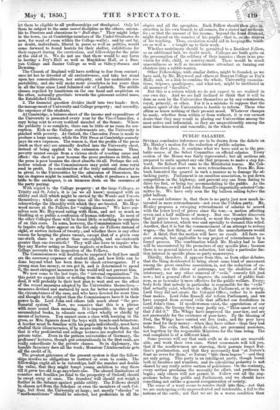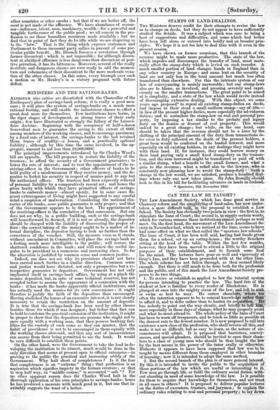PUBLIC SALARIES.
&Teller. conclusive inferences are to be drawn from the debate on Mr. Henley's motion for the reduction of public salaries.
In the first place, it confirms what we have said as to the pro- bable course of the Select Committee on official salaries. Every section of the House was fairly represented; but all sections are prepared to unite against any one that proposes to make a step for- ward. Sir Robert Peel came to the Ministerial rescue. Mr. Cob- den discovered an answer to mere retrenchment. Even Hr. Roe- buck fomented the quarrel in such a.manner as to damage the at; tanking party. Parliament is an omnibue association top utidown. competition on the highway, and prevent any one from d ,u g to drive too fast, or being too accommodetine to the public. As the whole House, so will Lord John Russell's impartially-selected Com- mittee be. We have only seen the big balloon sailing before the pilot balloon.
A second inference is that there is no party just now much in-
terested in mere retrenchments-not even the Cobden. party. Mr. lffenley proposes a sweeping retrenchment of salaries to accord with the lower level of prices since the war,—a motion affecting seven and a half millions of money. But one Member discovers that if prices have been. reduced, so must the expenditure be to the landed. interest, which was said specially to demand.this relief. Another, that it is but the commencement of an attempt to reduce, wages,--the last thing, of course that the manufacturers would do! A third, that the motion will have no result. All facts co- gent enough, but applicable to any project of retrenchment by a. forced. process. The combination which Mr. Henley had to face will be encountered by the promoters of any specific plan; because there is no general interest in reduction, but only a particular fac- tion interest in specific plans as party manoeuvres.
Thirdly-, therefore it appears from. this, as from other debates, that the thing desideeated to bring about some kind of movement among the great omnibus association, is, not the reduction. of ex- penditure, nor the abuse of patronage, nor the abolition of the aristocracy, nor any other removal of " evils " scarcely felt just now; but a general effort to improve the conduct of public busi- ness, so as toreador it more effective for the public welfare. Every- body feels that nobody in particular is responsible for the "evils" that actually exist, whether in office, in Parliament, or in society
Lord Grey ad not create the Colonial Office ; rather he is e than makes. Lord John Russell did reform Parliament,. and we- have escaped from several evils that afflicted our forefathers in. Lord John's time. If needlewomen exist,- the opprobrium_ of our social state, Sir George Grey may justly cry' "Thou mist not say that I did it." The Whigs have improved the p000rlam, and are not answerable for the existence of poor-laws. By the blessing of Peel, the Whigs have carried out free trade, and the poor have more food for their money—when they have either—than they had before. The evils, their, which do exist, are perennial monsters,, not begotten by the responsible Ministers for the time being. The real complaint is of a different kind-
Some persons will say that such evils as do exist are unavoid- able, and work their own cure. Strict economists will tell you, that if the needlewomen are starving, their parents forgot Mal- thus's proclamation, and that they necessarily, find "at Nature's feast no cover for them," so Nature "bids them begone "—and they are only going. This party is an intelligent party, though borne both in faculties and numbers, and its calculating pedantry is not shared by-any really active section of politicians. On. the con
every section proclaims the necessity for effort, and professes to begin. only others Will not permit it. Follow out all the sug- gestions before the public and Parliament, and we shoulil have something not maitre a general reorganization. of society.
The sense of a want seems to resolve itself into this,—not that we are undergoing evils unprecedented and intolerable, a foil to the nations of the earth ; not that we are in a worse condition than other countries or other e ha; but that if we are better off, the most is not made of the nence. We have abundance of resour- ces--influence, talent, men machinery, wealth—for a powerful and tangible furtherance of the public good ; we all concur in the pro- fession to see those boundless resources made available ; but we fiitd that in point of fact they do lie idle while we are disputing as to the "how." That is the thing which exposes statesmen and Parliament to these incessant party sallies in pursuit of some par- ticular public benefit. Mr. Disraeli foresees a revolution through farmer discontent : which is not impossible; for although discon- tent at abridged affluence is less dangerous than discontent at posi- tive privation, it has its bitterness. Moreover, several of the really destitute and dangerous classes are ever ready to add the momen- tum and vehemence of their discontent to the more moderate vexa- tion of the other classes. In this sense, every triumph over such a motion as Mr. Henley's is a victory pregnant with future defeat.
1St

























 Previous page
Previous page